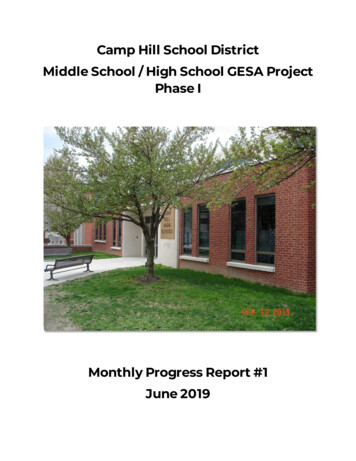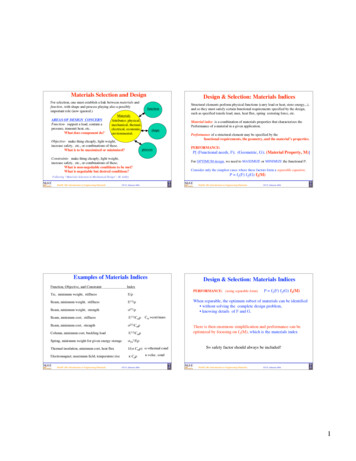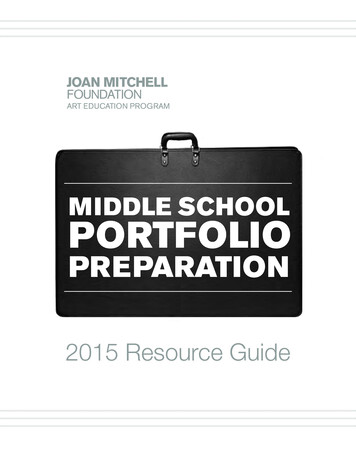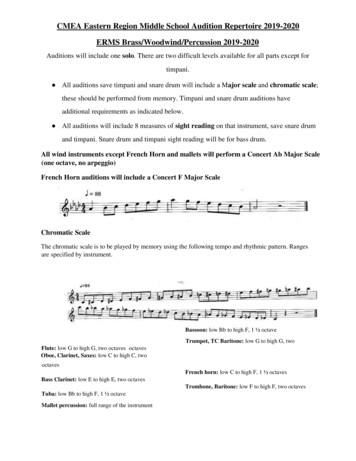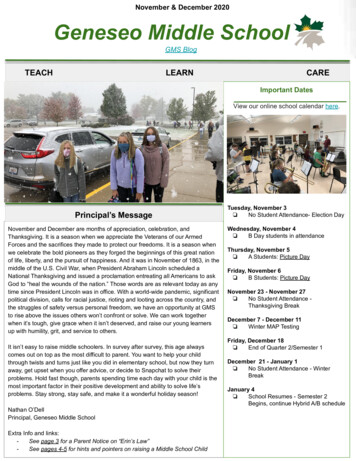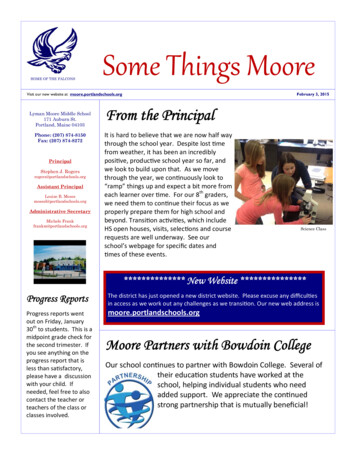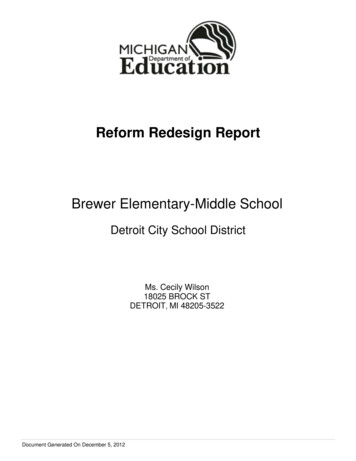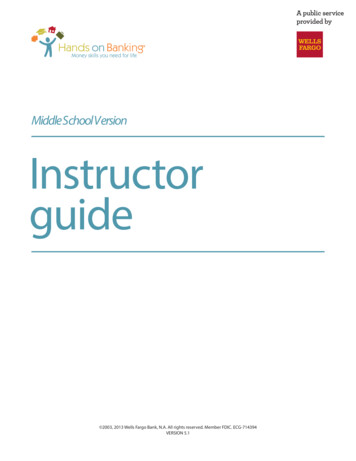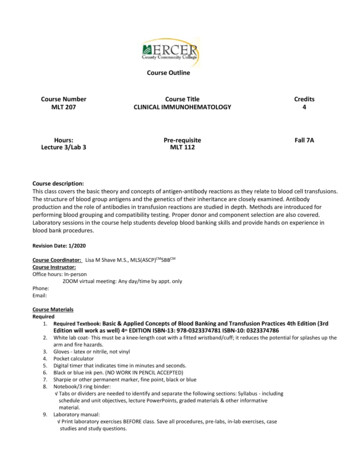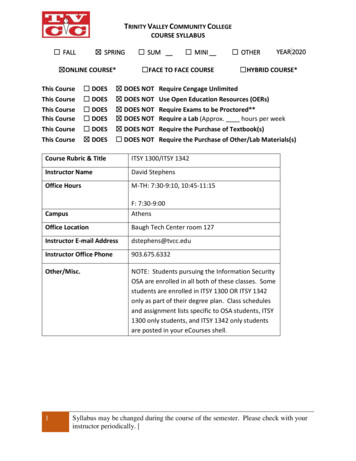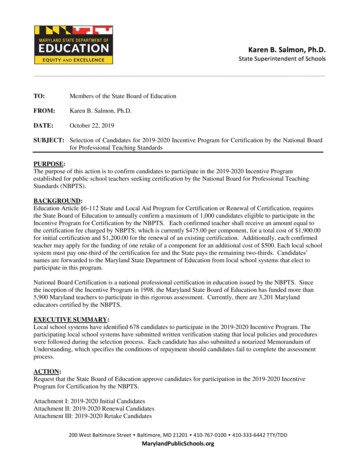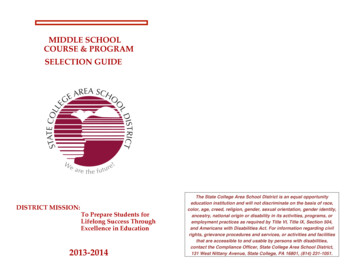
Transcription
MIDDLE SCHOOLCOURSE & PROGRAMSELECTION GUIDEDISTRICT MISSION:To Prepare Students forLifelong Success ThroughExcellence in Education2013-2014The State College Area School District is an equal opportunityeducation institution and will not discriminate on the basis of race,color, age, creed, religion, gender, sexual orientation, gender identity,ancestry, national origin or disability in its activities, programs, oremployment practices as required by Title VI, Title IX, Section 504,and Americans with Disabilities Act. For information regarding civilrights, grievance procedures and services, or activities and facilitiesthat are accessible to and usable by persons with disabilities,contact the Compliance Officer, State College Area School District,131 West Nittany Avenue, State College, PA 16801, (814) 231-1051.
MIDDLE SCHOOLS’ MISSION STATEMENTPA ACADEMIC STANDARDSThe mission of both middle schools is to develop responsible,productive, and effective individuals who demonstrate lifelonglearning skills, embrace cultural diversity, show respect for self andthe rights of others, work cooperatively, and practice good citizenshipThe courses taught in the middle schools have been aligned with the PAAcademic Standards adopted by the Pennsylvania State Board ofEducation. Additionally, our school district has identified technologycompetencies that all students should master. These competencies areintegrated into the courses contained in this booklet and are formallyassessed and reported in the sixth and eighth grades.MT. NITTANY MIDDLE SCHOOL ADMINISTRATORS:Mr. Brian Ishler, PrincipalMt. Nittany Middle School814-272-4270e-mail address: bhi12@scasd.orgMs. Jacquelyn Martin, Director of Curriculum – Grades 7-12e-mail address: jmm58@scasd.org 814-231-1082Mr. Brian Peters – Director of Curriculum – Grade K-6e-mail address: bkp11@scasd.org 814-231-1183PARK FOREST MIDDLE SCHOOL ADMINISTRATORS:Dr. Karen Wiser, PrincipalPark Forest Middle School814-272-8475e-mail address: kxw13@scasd.orgMs. Jacquelyn Martin, Director of Curriculum – Grades 7-12e-mail address: jmm58@scasd.org 814-231-1082Mr. Brian Peters – Director of Curriculum – Grade K-6e-mail address: bkp11@scasd.org 814-231-1183Mr. Mark Feldman, Assistant PrincipalMt. Nittany Middle School814-272-4050e-mail address: mjf15@scasd.orgMr. Larry Walker, Assistant PrincipalPark Forest Middle School814-237-5301e-mail address: law22@scasd.orgMT. NITTANY MIDDLE SCHOOL COUNSELORS:PARK FOREST MIDDLE SCHOOL COUNSELORS:Mr. Robert Fox (6th Grade)e-mail address: rwf15@scasd.orgTBA (6th Grade)e-mail address:Mr. Doug Romig (7th Grade)e-mail address: dtr12@scasd.orgTBA (7th Grade)e-mail address:Ms. Linda Brown (8th Grade)e-mail address: lsb11@scasd.orgMr. Craig Herzing (8th Grade)e-mail address: cjh21@scasd.orgMt. Nittany Middle School Counseling phone number:814-272-5944Park Forest Middle School Counseling Office phone number:814-237-5304
REGISTRATION TIME LINETABLE OF CONTENTSThe registration procedure includes several steps to help students makecareful choices. Students will have an opportunity to meet withcounselors to receive information about the registration process and tocomplete the registration forms. These meetings will take place in thestudents’ regularly scheduled classes.6th into 7th Grade:April 1-April 8March 25 – April 5April 15April 11-17April 19Distribute Selection Forms and visit 6th gradeclasses for course registration (modify form toinclude URL for online Middle School CoureGuide)]Open data base enter Math/Englishrecommendations - 6th gradeCollect Students Blue Selection FormsEnter World Language and Music and sign blueSelection Forms to the officeNotification email about 6th grade requests inParent Portal7th into 8th Grade:March 25-29April 1-April 5April 5-April 12April 15April 15-19April 29World Language Placement TestingAdminister Algebra Prognosis TestTeachers enter recommendationsDistribute scheduling materials to Scienceteachers includes registration form and letter toparents, and Middle School Selection ProgramGuide will now be onlineStudents enter registration on course requestsusing laptops. Science Teachers Collect greenregistration forms and return to the officeEmail notification to parents that courserecommendations/ request are are available inParent PortalPagesCOUNSELING SERVICES:p. 1TEAM BASED COURSES:EnglishMathematicsScienceSocial StudiesArtGeneral Musicp. 2pp. 3/4/5p. 6p. 8p. 7p. 9EXPLORATORY COURSES:Music ElectivesHealthPhysical EducationWorld LanguagesFamily & Consumer SciencesTechnology Educationpp. 9/10p. 11pp. 11/12pp. 12/13/14pp. 15/16pp. 16/17INSTRUCTIONAL PROGRAM OPTIONS:Learning EnrichmentSpecial EducationEnglish Language LearnersDeltap. 17/18p. 19p. 20pp. 20/ 21/22EXTRA CURRICULAR/AREA ACTIVITIES:A.R.E.A.Interscholastic AthleticsIntramural ActivitiesStudent Activitiesp.p.p.p.2323/242425APPENDIX A: Special Education Services and Annual PublicNoticepp. 26/27/28
COUNSELING SERVICESTEAM BASED COURSESENGLISHThe mission of the Counseling Department is to provide supportservices and curricular programs that contribute to the development ofresponsible, productive, and effective individuals who demonstratelifelong learning skills, embrace cultural diversity, show respect for selfand the rights of others, work cooperatively and practice goodcitizenship. As recommended by the Pennsylvania Department ofEducation and the Pennsylvania School Counselors Association, ourcounseling programs focuses on the personal, social, academic, andcareer development of all students.7th-Grade English Group CounselingThe 7th-grade English program continues to develop students’ languagearts abilities through a wide range of multilevel activities. Readinginstruction focuses on developing skills in reading comprehension andvocabulary. In addition to studying mythology, students read shortstories, novels, and poetry related to a variety of age-appropriate themes.Students continually self-assess their own writing through both writingon-demand assessments and assignments that focus initially on thestructure of the single paragraph and later on the multi-paragraph essay.Students produce multiple drafts and revise them in response to peerreviews and formal instruction in writing strategies, grammar, mechanics,and style. Through short talks, oral reports, dramatic readings, andpractice in note taking, students work to improve their speaking andlistening skills. Student achievement is based on teacher-prepared testsand quizzes and on the quality, thoroughness, and timely completion ofassignments and projects. While the curriculum across levels is similar,the expectations and emphases may vary. In addition, specific experiencesmay vary as a result of interdisciplinary projects developed by each team. Individual Counseling8th-Grade EnglishThe services and programs that our Counseling Department offersinclude: Eductional Support and Planning Career Education and Development Initiatives Conflict Resolution, Anti-Bullying, and Scoial Skill Programs Coordination with and Referrals to Community Agencies Parent/Guardian Consultation Staff Consultation New Student Orientation, Testing, and Scheduling Coordination of Peer Mediation Program Community Outreach and Service Maintenance of Student Records-1-The 8th-grade English program builds on the language arts skillsdeveloped in 7th grade. Students read and interpret novels, short stories,plays, poetry, and nonfiction and begin to critically analyze literature. Thewriting program continues to emphasize the writing process. Studentsrespond to both writing-on-demand assessments and assignments thatrequire them to apply formal instruction in writing strategies, grammar,mechanics, and style to primarily expository and persuasive writingassignments. Informal talks, oral reports, and poetry readings developspeaking and listening skills. Student achievement is assessed throughteacher-prepared tests and quizzes, writing portfolios, conferences, andgroup and individual projects and presentations. While the curriculumacross levels is similar, the expectations and emphases may vary. Inaddition, specific experiences may vary as a result of interdisciplinaryprojects developed by each team.-2-
MATHEMATICSThis curriculum is committed to making connections across instructional unitsof study and to application of mathematics in the real world. Problems are set incontext and time is provided to reflect and reason on connections. Emphasis isplaced on students discussing the problems in class, talking through theirsolutions and learning how to communicate their solutions. Students learn tocommunicate by using different representations such as graphs, tables, formulasor written explanations. Students are appropriately challenged to connect ideasand make formal and informal generalizations as they apply to their currentneeds. The instructional materials are structured into units of study that take 4 to8 weeks each. Each unit is focused around problem situations that help studentslearn an important set of related mathematical ideas and to become skillful atusing these ideas to solve problems. The curriculum is structured to helpstudents learn to communicate their strategies and reasoning so thatmathematical understandings are more thoroughly developed. The kinds ofproblems that the students will work on in class, as well as for homework, arechallenging and interesting. Our main goal is to help all of our students to besuccessful in their study of mathematics as they proceed through progressivelychallenging courses.Recommendations for mathematics courses are made by the student’scurrent math teacher based on present level of success and assessment data.Introduction to Algebra and Geometry 7: The general goal of this course is todevelop mathematical skills and to apply these skills to solve problems incontexts that are interesting to the students. The topics of study include: 1) theintroduction of variables, tables, graphs, and symbols as representations; 2)linear relationships; 3) similarity; 4) probability; and 5) rate, ratio, proportion,percent, and proportional reasoning. Embedded throughout is the application oftechnology including spreadsheets, number sense and estimation, and modelingwith multiple representations.Advanced Math 7: The general goal of this course is to develop mathematicalskills and to apply these skills to solve problems in contexts that are interestingto the students. The topics of study include: 1) the introduction of variables,tables, graphs, and symbols as representations; 2) integers; 3) similarity; 4)Pythagorean Theorem and irrational numbers; and 5) rate, ratio, proportion,percent, and proportional reasoning. Embedded throughout is the application oftechnology including spreadsheets, number sense and estimation, and modelingwith multiple representations.-3-Algebra and Geometry 8: The general goal of this course is to develop pre- andbeginning-algebra skills and to apply these skills to solve problems incontexts that is interesting to students. The topics of study include: 1) linearrelationships; 2) probability; 3) Pythagorean Theorem and irrational numbers; 4)3surface area and volume; 5) an introduction to functions and modeling; 6) rationalnumbers; and 7) solving equations and inequalities. Embedded throughout is theapplication of technology, graphing calculators and spreadsheets, number senseand estimation, proportional reasoning, computation, integer operations, andmodeling with multiple representations.Advanced Algebra 1: This course is designed for students in the AdvancedCollege Preparatory program. The students should have an excellentunderstanding of arithmetic concepts, abstract-reasoning skills, and beindependent, organized, and self-motivated.The general goal of this course is to develop strong conceptual understanding offunctions as well as fluency in representing, solving, graphing, interpretingfunctions and the related skills. Topics of study include: 1) solving multisteplinear equations, inequalities, and absolute value equations; 2) solving systems oflinear equations; 3) solving quadratic equations; 3) exponents and exponentialfunctions; 4) radical expressions and equations; 5) rational expressions andfunctionsIn the classroom students will work cooperatively using graphing calculators astools to explore real-life situations, to create mathematical models, and to comparefamilies of functions using multiple representations. This course prepares studentsfor Advanced Geometry.Advanced Geometry: The general goal of this course is to develop anunderstanding of geometric concepts and logical thinking skills needed inthe solution of problems. Topics of study include inductive and deductivereasoning, direct and indirect proofs, lines and planes, polygons, circles,loci, constructions, coordinate geometry, areas of plane figures, areas andvolumes of solid figures, and elementary right triangle trigonometry.More advanced and difficult problems are covered, and the proofs arepursued more rigorously than in a regular geometry course. This courseprepares students for Advanced Algebra 2.-4-
Mathematics ProgramThe State College Area School District has a comprehensive mathematicsprogram for students with varying interests, backgrounds, and aptitudesin mathematics. There are Advanced, College-Prep, and Standard coursesequences. All course sequences are designed to prepare students forcontinuing education after high school.Each course sequence includes experiences with Common-CoreMathematics strands of Number and Quantity, Algebra, Functions,Modeling, Geometry, Statistics and Probability. The Standard sequenceis designed for college and career readiness and to prepare students tomeet competencies as required by the state. College-Prep courses coverall state-required competencies, but also include more in depthexperiences than Standard courses. Advanced courses are moremathematically rigorous, including rich experiences with reasoni
The courses taught in the middle schools have been aligned with the PA Academic Standards adopted by the Pennsylvania State Board of Education. Additionally, our school district has identified technology competencies that all students should master. These competencies are integrated into the courses contained in this booklet and are formally assessed and reported in the sixth and eighth grades .
